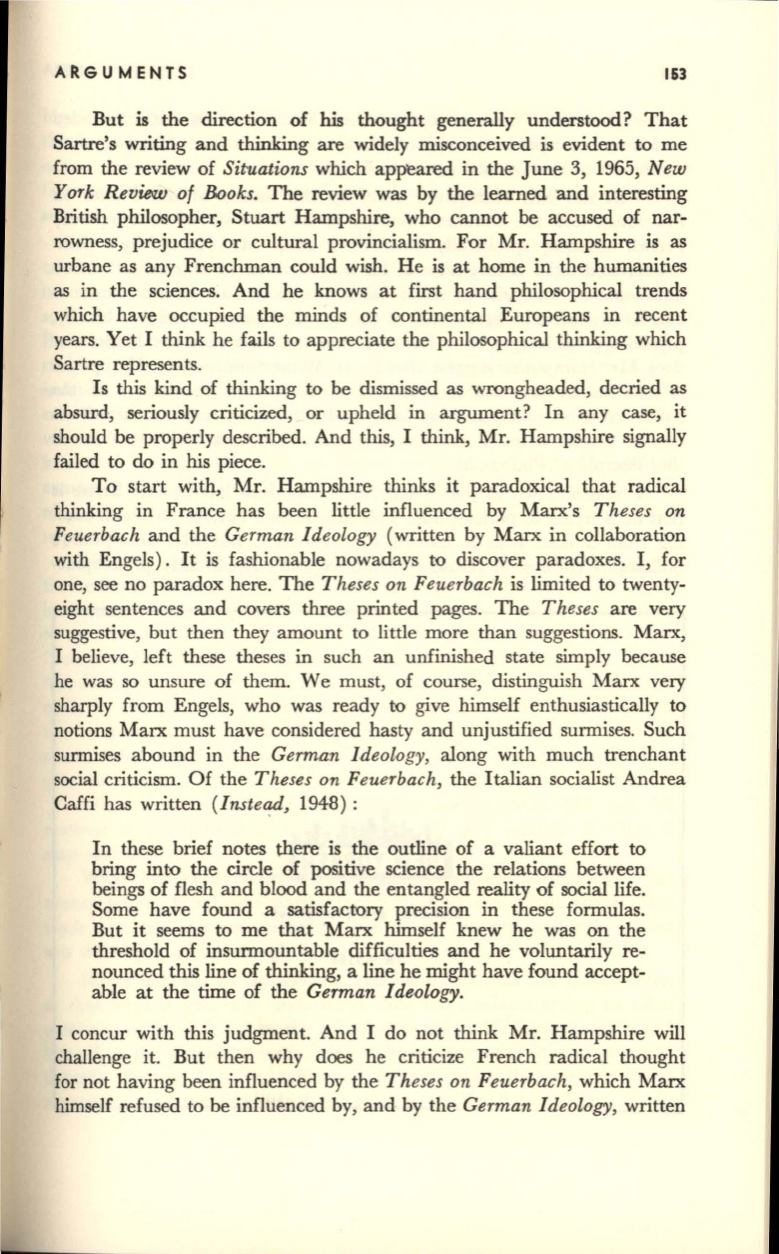
ARGUMENTS
163
But
is
the direction of his thought generally understood? That
Sartre's writing and thinking are widely misconceived is evident to me
from the review of
Situations
which appeared in the June 3, 1965,
New
York Review of Books.
The review was by the learned and interesting
British philosopher, Stuart Hampshire, who cannot be accused of nar–
rowness, prejudice or cultural provincialism. For Mr. Hampshire is as
urbane as any Frenchman could wish. He is at home in the humanities
as in the sciences. And he knows at first hand philosophical trends
which have occupied the minds of continental Europeans in recent
years. Yet I think he fails to appreciate the philosophical thinking which
Sartre represents.
Is this kind of thinking to be dismissed as wrongheaded, decried as
absurd, seriously criticized, or upheld in argument? In any case, it
should be properly described. And this, I think, Mr. Hampshire signally
failed to do in his piece.
To start with, Mr. Hampshire thinks it paradoxical that radical
thinking in France has been little influenced by Marx's
Theses on
Feuerbach
and the
German Ideology
(written by Marx in collaboration
with Engels). It is fashionable nowadays
to
discover paradoxes. I, for
one, see no paradox here. The
Theses on Feuerbach
is limited to twenty–
eight sentences and covers three printed pages. The
Theses
are very
suggestive, but then they amount to little more than suggestions. Marx,
I believe, left these theses in such an unfinished state simply because
he was so unsure of them. We must, of course, distinguish Marx very
sharply from Engels, who was ready
to
give himself enthusiastically to
notions Marx must have considered hasty and unjustified surmises. Such
surmises abound in the
German Ideology,
along with much trenchant
social criticism. Of the
Theses on Feuerbach,
the Italian socialist Andrea
Caffi has written
(Instea:tJ,
1948):
In these brief notes there is the outline of a valiant effort to
bring into the circle of positive science the relations between
beings of flesh and blood and the entangled reality of social life.
Some have found a satisfactory precision in these formulas.
But it seems to me that Marx himself knew he was on the
threshold of insurmountable difficulties and he voluntarily re–
nounced this line of thinking, a line he might have found accept–
able at the time of the
German Ideology.
I concur with this judgment. And I do not think Mr. Hampshire will
challenge it. But then why does he criticize French radical thought
for not having been influenced by the
Theses on Feuerbach,
which
Marx
himself refused to be influenced by, and by the
German Ideology,
written


